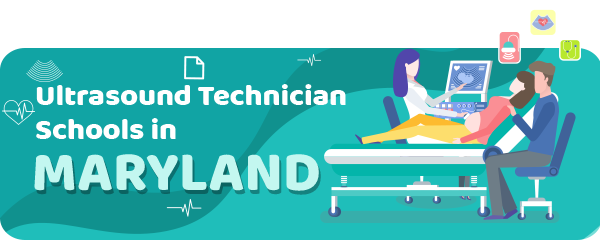Maryland is a small but wealthy state, with transportation being its main industry.
Health care is a growing sector, and this means the demand for ultrasound technicians is also growing.
These specialists also earn, on average, more than those in other states, but the cost of living is also higher.
Annual Salary Range:| Location | Avg. Annual Salary |
|---|---|
| Baltimore | $78,505 |
| Columbia | $78,378 |
| Germantown | $82,181 |
| Silver Spring | $84,515 |
| Waldorf | $84,286 |
| Frederick | $81,729 |
| Ellicott City | $78,454 |
| Glen Burnie | $78,505 |
| Gaithersburg | $84,286 |
| Rockville | $84,414 |
Article Table of Contents
Regional Salary in Maryland
| Region | Employed | Avg. Annual Salary | Avg. Hourly Pay | Top 10% Annual Salary | Bottom 10% Annual Salary |
|---|---|---|---|---|---|
| Baltimore-Columbia-Towson, MD | 570 | $87,390 | $42.01 | $102,490 | $76,800 |
| California-Lexington Park, MD | 30 | $81,450 | $39.16 | $109,680 | $55,170 |
| Hagerstown-Martinsburg, MD-WV | 60 | $80,730 | $38.81 | $96,270 | $59,520 |
| Salisbury, MD-DE | 130 | $87,700 | $42.16 | $104,800 | $67,810 |
* Employment conditions in your area may vary.
Getting Certified
It is a good idea to obtain a certification as an ultrasound technician, before seeking employment in this state.
To get certified, candidates have the option to enroll in either degree or non-degree training programs.
The non-degree programs last for about 1 year, but they need accreditation from the CAAH, or Commission on Accreditation of Allied Health.
The degrees available to these professionals are Associate’s and Bachelors and these last for 2 or 4 years.
Regardless of your choice for a degree, make sure the training includes practical hours in a clinic or hospital setting.
These hours are needed so that students will become used to the equipment they’ll be using.
It’s worth noting that there are several specialties within the ultrasound field, such as:
- MRI
- Radiography
- Ultrasound
- Echocardiography
- Vascular
- Sonography
There are special training courses for each of these specialties, and the students will have both common classes across the specializations, as well as specific ones.
Students might have subjects like the following:
- Ultrasound physics,
- Pathophysiology,
- Vascular ultrasound
Each investigation method makes use of different equipment.
| School Name | Address |
|---|---|
| Howard Community College | 10901 Little Patuxent Parkway Columbia, MD 21044 |
| Montgomery College | 7600 Takoma Ave. Takoma Park, MD 20912 |
| Johns Hopkins Hospital | 111 Market Place Suite 830 Baltimore, MD 21202 |
| University of Maryland Baltimore County | 1450 S Rolling Road Baltimore, MD 21227 |
When the educational program is complete, students can sit through the ARDMS Sonography Principles & Instrumentation (SPI) exam.
Non-accredited Degree
If you enroll in such a program, you’ll still have to take the above exam.
Only those who meet these next requirements can register for the test:
- Complete an internship,
- Accumulate 60 semester hours,
- Accumulate 12 months of work experience
Other Certifications
The American Registry of Radiologic Technologists also issues licenses for ultrasound technicians in Maryland.
Those obtaining their license are allowed to work in the vascular or breast sonography fields.
For this certificate, the candidates must complete 2 years of employment as a non-invasive cardiovascular technician.
This certificate must be renewed every 2 years, but only after undergoing 24 continuing education credits.
These credits have to be done through an approved program.
Enrolling Requirements
It’s possible that those interested in enrolling in some of the programs would have to meet certain requirements.
These could include having passed certain subjects, such as:
- Physiology,
- Medical terminology,
- Anatomy
It’s a good idea to contact the school you’re interested in enrolling at and ask more about their requirements, as they could be different from other schools, and from program to program.
Read the full guide: How to Become an Ultrasound Technician
